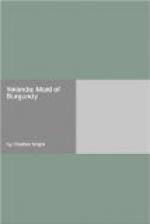“Kill him! Kill him!”
Again the battle-axe rose; but after a pause, Max let it fall to the ground behind him; and, turning toward the girl, lifted her with his mailed hands to her feet. When she had risen Max looked into her face, and, falling back a step, exclaimed in a voice hushed by wonder:—
“Yolanda!”
His words coming to the girl’s ears, like a far-away sound, from the cavernous recesses of his helmet, frightened her.
“No, no, my name is not Yolanda. You are mistaken. You do not know me. I—I am the princess. You do not know me.”
Her words were prompted by two motives: she wished to remain unknown to Max, and she feared lest her father should come to know that a great part of her life was spent as a burgher girl. Her hands were clasped at her breast; her face was as pale as a gray dawn; her breath came in feeble gusts, and her words fell haltingly from her lips. She took two steps forward, her eyes closed, and she began to fall. Max caught her and lifted her in his strong arms. On great occasions persons often do trivial acts. With Yolanda held tightly in the embrace of his left arm, Max stooped to the ground and picked up his battle-axe with his right hand. Then he strode to the north end of the lists and placed the girl in my arms.
“Yolanda,” he said, intending to tell me of his fair burden.
“No, Max,” I whispered, as he unfastened his helmet. “Not Yolanda, but the princess. The two resemble each other greatly.”
“Yolanda,” returned Max, doggedly. “I know her as a mother knows her first-born.”
Not one hundred seconds had elapsed between the report of the arquebuse and the placing of Yolanda in my arms; but hardly had Max finished speaking when a dozen ladies crowded about us and took possession of the unconscious princess.
After the duke had set on foot a search for the man who had fired the arquebuse, he came down to the false lists and stood with Hymbercourt and me, discussing the event. Campo-Basso said that his heart was “sore with grief,” and the Italians jabbered like monkeys. One of them wanted to kiss Max for sparing his kinsman’s life, but Max thrust him off with a fierce oath. The young fellow was in an ugly mood, and if I had been his enemy, I would sooner have crossed the path of a wounded lion than his. He was slow to anger, but the treachery he had encountered had raised all of Satan that was in him. Had he stood before Calli thirty seconds longer that treacherous heart would have ceased to beat.
While we were standing in the false lists, speaking with the duke, an Italian approached Max, bowed low, and said:—
“The noble Count Calli approaches to thank you for your mercy and to extol your bravery.”
Max turned his head toward the centre of the course, and saw Calli surrounded by a crowd of jabbering friends who were leading him toward us. A black cloud—a very mist from hell—came over Max’s face. He stooped and took his battle-axe from the ground. I placed my hand on the boy’s arm and warningly spoke his name:—




